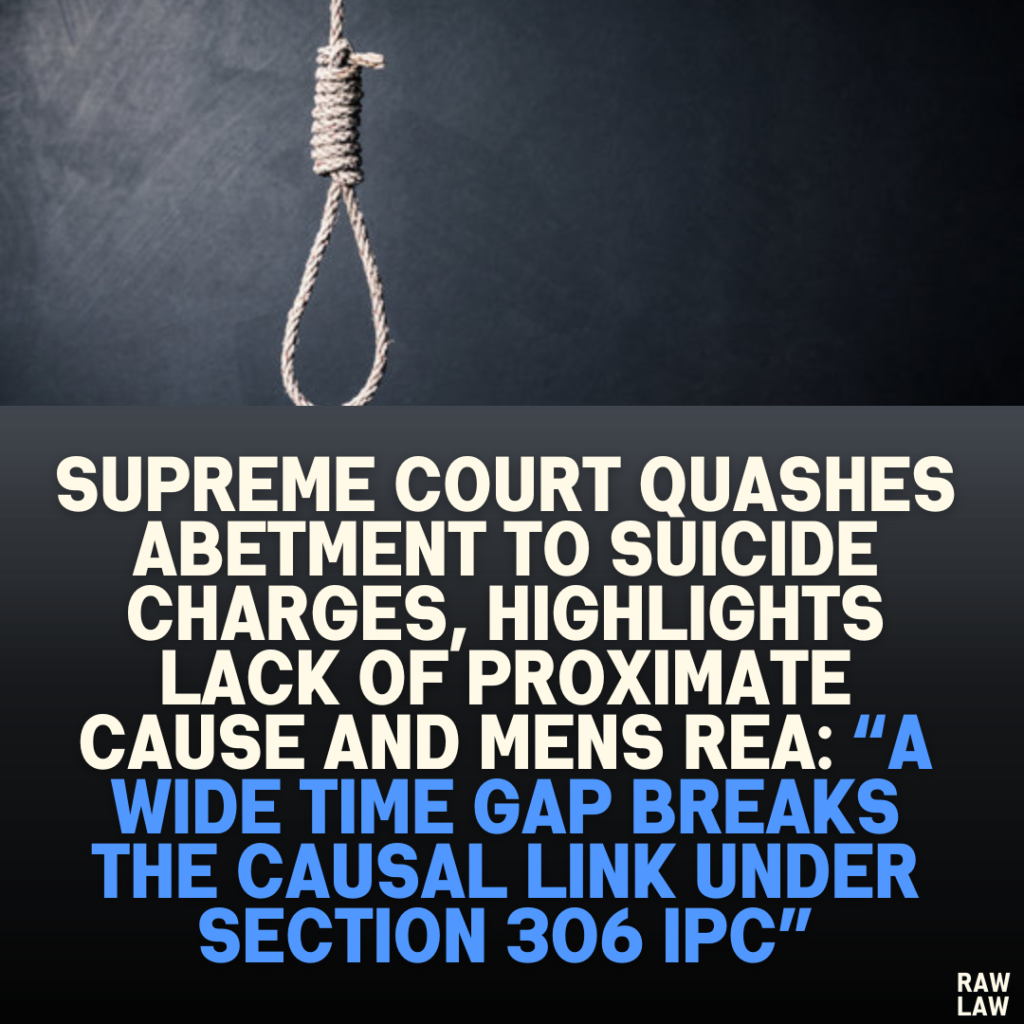Court’s Decision
The Supreme Court allowed the appeal, quashing the High Court’s and the trial court’s orders that had refused to discharge the appellants. The Court held that:
- There was no proximate connection between the alleged acts of the appellants and the suicide committed by the deceased.
- The absence of mens rea or a direct act of instigation meant the appellants could not be held guilty of abetment to suicide under Section 306 IPC.
Facts of the Case
- The deceased, a 25-year-old woman, committed suicide by hanging herself on March 20, 2015, at her paternal home.
- She had been married to Appellant No. 1 since November 2009, with whom she had twin sons. Disputes arose in her matrimonial life, leading to separation in August 2013.
- On February 17, 2015, a mahalokadalat was held where the appellants allegedly refused reconciliation and advised the deceased to remarry.
- Five days after the incident, an FIR was lodged by the deceased’s mother alleging harassment by the appellants, accusing them of mental and physical torture.
Issues
- Did the appellants’ actions amount to abetment of suicide under Section 306 IPC?
- Was the time gap between the alleged act of instigation and the suicide sufficient to break the causal link required to sustain charges under Section 306 IPC?
Petitioner’s Arguments
- Delay in Filing the FIR: The FIR was lodged five days after the suicide, raising doubts about its genuineness and credibility.
- Lack of Proximate Connection: The appellants had not interacted with the deceased since the mahalokadalat, which was held over a month prior to her death. A time gap of such magnitude negated the causal link between the alleged acts and the suicide.
- Absence of Mens Rea: There was no evidence showing that the appellants intended to instigate or compel the deceased to commit suicide.
- Accidental Death Report: The initial report filed on the day of the suicide did not mention any harassment or abetment by the appellants.
Respondent’s Arguments
- Sufficient Material on Record: The allegations in the FIR and evidence gathered during the investigation were adequate to proceed with the trial.
- Concurrent Findings: Both the trial court and the High Court had found sufficient grounds to reject the discharge application.
Analysis of the Law
Section 306 IPC (Abetment of Suicide)
To constitute the offence of abetment to suicide, the prosecution must prove:
- An act of suicide by the deceased.
- Abetment of the act by the accused, as defined under Section 107 IPC.
Section 107 IPC (Abetment Defined)
- Abetment requires:
- Instigation to commit the act,
- Engagement in a conspiracy for committing the act, or
- Intentional aid in committing the act.
Essentials for Prosecution
- Mens Rea: Clear intent to instigate or aid the suicide.
- Proximate Cause: A direct and immediate connection between the accused’s actions and the suicide.
Precedent Analysis
The Court referred to several precedents to highlight the principles governing abetment to suicide:
- Sanju @ Sanjay Singh Sengar v. State of M.P.
- A time gap of 48 hours between the alleged abusive words and the suicide was held insufficient to establish a proximate link.
- Jayedeepsinh Pravinsinh Chavda v. State of Gujarat
- Proximity between the alleged act and the suicide is crucial for proving abetment.
- Ude Singh v. State of Haryana
- Mere harassment without a direct or proximate act of instigation cannot constitute abetment.
- Mohit Singhal v. State of Uttarakhand
- The act of instigation must occur in close temporal proximity to the suicide for charges to sustain.
Court’s Reasoning
- Proximity of Events: The mahalokadalat incident occurred over a month before the suicide. The Court found this time gap too wide to establish a direct causal link.
- Disputed Date of Incident: The appellants argued that the mahalokadalat actually took place a year earlier. Even accepting the FIR’s timeline, the Court held that the time gap diluted the alleged instigation.
- Initial Report vs. FIR: The Accidental Death Report, filed on the day of the incident, did not mention harassment or instigation by the appellants. These allegations surfaced only in the FIR lodged five days later.
- Mens Rea: The prosecution failed to show that the appellants intended to push the deceased into a position where suicide was her only option.
Conclusion
The Court concluded that:
- There was no proximate or causal link between the alleged acts and the suicide.
- The FIR lacked credibility due to the delay and absence of corroborating evidence.
- Continuing criminal proceedings against the appellants would amount to an abuse of process.
Implications
This judgment reinforces key principles:
- A time gap between the alleged act of abetment and the suicide can negate the causal link required under Section 306 IPC.
- Courts must scrutinize allegations of harassment or instigation closely, ensuring there is cogent evidence of mens rea and a direct nexus with the suicide.
- Mere allegations of harassment, without clear intent or proximity, cannot sustain charges of abetment to suicide.
